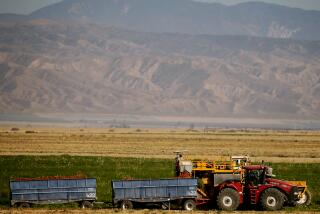Tense Times Among the Brotherhood
The Miracle of March seems to have ended, and the rains have faded away to wherever they go when they’re avoiding California. But who cares. We had our March, didn’t we?
You bet. March changed everything, even in ways we did not expect. Let me tell you a story about that. It has to do with a strange crop grown out in the desert and how this crop almost--but not quite--put some of the big water boys at each others’ throats.
The story begins in mid-February. I got a phone call from a man who has played at the water game for many years in Sacramento. He wanted to know if I was familiar with a crop known as Sudan grass.
No, I said. I was not familiar with Sudan grass.
Long pause. Then you should call this number, he said. You will learn some very interesting facts about Sudan grass.
The number belonged to the second-in-command at a major water agency. I was told the second-in-command would not want to be quoted. He would merely reveal his facts.
Now keep in mind that mid-February was a period when we thought a way of life was slipping away in California. People at all levels were scrutinizing each other for water crimes. In the major agencies, the bureaucrats were scared.
So I called. The second-in-command asked me the same question: Had I ever heard of Sudan grass? He got the same answer.
It’s a roughage product, he said. Intended for cows, both dairy and meat. They grow it in the Imperial Valley with water from the Colorado River. A tall, green grass. Very pretty in the field.
I inquired about the problem with this very pretty grass.
It just happens to suck up water like a blotter sucks up ink, he said. In a season, you will need four to six feet of water for every acre of grass. That’s more than rice, more than alfalfa, more than any other crop in California.
Last year, he figured we poured enough water on Sudan grass to supply the city of San Francisco. This year, we will use even more.
And that’s not the best part, he said. It turns out Sudan grass isn’t grown for American cows. It’s grown for Japanese cows. The Japanese ranchers love Sudan grass, and their cows are the most pampered in the world. The Japanese ranchers feel such devotion to their cows that they will pay for the very best.
So the Imperial farmers grow the Sudan grass for cows on the other side of the Pacific Rim, using cheap water from the Colorado. It’s harvested and then--the final irony--gets shipped to Japan inside containers that once held VCRs and televisions headed for this country.
Lookit, the second-in-command said. The Japanese are getting our water. That’s what it comes down to. Meanwhile, you and I worry about how much we use to brush our teeth.
Not a bad story. But there was something else even better. The whole episode suggested the old brotherhood of water barons in California was breaking under the strain.
The second-in-command was trying to embarrass not only the farmers but the huge Imperial Irrigation District, which supplies the farmers. One member of the brotherhood was trying to cut off another at the pockets.
I was delighted. In the past, these guys had always formed a solid line. If they turned on each other, there was no limit to the good that could come of it. If parts of the brotherhood were willing to go after Imperial over Sudan grass, maybe they would also go after the rice farmers of the Sacramento Valley.
What about the cities of Fresno and Sacramento, which don’t even meter their users? Without the protection of the brotherhood, could they long stand the assault of sweet reason? Quien sabe. It was like watching the disintegration of the Kremlin.
Then March came. First one storm and then another. Congressional committees showed up to reform the system, but they got no ink in the newspapers. It was raining.
This week I made some more calls about Sudan grass. Things are going well in the Imperial Valley. A big season is anticipated. The Japanese farmers will be pleased.
As for the brotherhood, I have heard nothing more. I guess they figure the need has passed.
More to Read
Sign up for Essential California
The most important California stories and recommendations in your inbox every morning.
You may occasionally receive promotional content from the Los Angeles Times.










